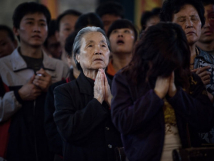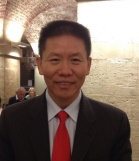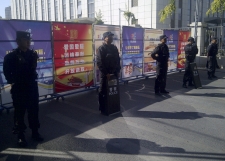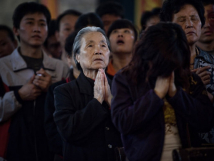There will be no meeting between Pope Francis and the Dalai Lama this weekend when the exiled Tibetan leader flies into Rome for a summit of fellow Nobel Peace Prize winners.
"This time I won't meet Pope Francis," the Dalai Lama told reporters, adding that he would have been "very happy" to do so.
Commentators were quick to brand the non-meeting as a "snub" by the Vatican, whose spokesman said: "Pope Francis obviously holds the Dalai Lama in very high regard but he will not be meeting any of the Nobel laureates." Instead, the Pope will send a video greeting to the conference.
Meetings between the Dalai Lama and foreign heads of state and religious leaders present enormous diplomatic challenges because of the resolute opposition of China to any such meetings taking place. At issue is the Dalai Lama's position as the spiritual head of the government in exile of Tibet, which is ruled by China and has been increasingly transformed by Chinese immigration. He has campaigned for Tibetan independence, and more recently for greater autonomy within China, which despite his strictly non-violence principles regards him as a supporter of terrorism.
His enormous international prestige – of which the award of the Nobel Peace Prize is an example – leads the Chinese government to be extremely touchy about whom he meets. The conference for Nobel prize-winners itself was originally scheduled for South Africa, but moved after the Pretoria government refused to issue the Dalai Lama with a visa under pressure from China.
Britain, too, has felt the wrath of China because of its hospitality to the Dalai Lama. A meeting took place between Prime Minister David Cameron, Deputy Prime Minister Nick Clegg and the Tibetan leader at St Paul's Cathedral in 2012 when he received the prestigious Templeton Prize. The forced cancellation of a visit to China by the prime minister the following year was seen as punishment for the meeting and is thought to have led to a change in Britain's diplomatic tone on the subject – China is one of Britain's most valuable trading partners and the government is extremely unwilling to risk the economic repercussions of seeming to support its enemy.
The Dalai Lama had several meetings with Pope John Paul II, whose experience of European communism made him particularly sympathetic to the plight of those suffering under the Chinese version. On the Pope's death, he said:
"His Holiness Pope John Paul II was a man I held in high regard. He was a determined and deeply spiritual minded person for whom I had great respect and admiration. His experience in Poland, then a communist country, and my own difficulties with communists, gave us an immediate common ground." He also met Pope Benedict, in 2007.
The context of the failure of Pope Francis to meet with the Dalai Lama is the growth of the Roman Catholic Church in China and the Vatican's desire to restore more harmonious relations with the authorities there. At issue are two irreconcilable claims to authority. The Chinese government insists on controlling the Church through the Chinese Patriotic Catholic Association (CPCA). An underground Roman Catholic Church refuses to compromise with the state and is loyal only to the Pope. The Vatican does not accept the validity of episcopal consecrations by the CPCA, though some progress has been made in mutual recognition.
Against this background, it is doubtful in the extreme that the Pope, in spite of the fact that he has won the reputation of ploughing his own furrow despite the advice of his advisers, would antagonise China for the sake of a meeting that could serve no practical purpose. Pope Francis has judged that the needs of China's Catholics can best be served without a meeting, and that the rights of Tibetans could only be marginally served with one. It is not a snub: it is simply diplomacy.

















